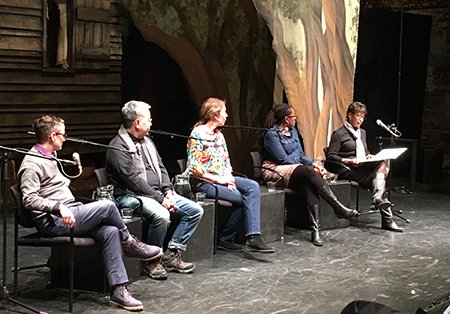ArtsEmerson panel tackles diversity on stage

Interrogating Whiteness panelists, left to right, Polly Carl, ArtsEmerson creative director; Ralph Peña, founder and artistic director of Ma-Yi Theater Company; Huntington Theatre artist-in-residence Melinda Lopez; Company One founder/director Summer Williams; and Emerson Vice President for Diversity and Inclusion Sylvia Spears. Photo/Erin Clossey
A white actor playing Martin Luther King Jr. A white actor playing a Japanese character in a production of The Mikado. White actors cast in roles written for South Asian actors.
The theater world has exploded with controversy recently over the casting decisions of stages from New York to a small college in Pennsylvania, raising questions of whose stories are being told, and how, and who decides?
ArtsEmerson took a hard look at these questions in “Interrogating Whiteness Part II: Controversies and Interventions in the Theatre,” held on February 9 in the Jackie Liebergott Black Box Theatre at the Paramount Center. The event, part of ArtsEmerson’s Public Dialogues series, featured a diverse panel of theater professionals and was moderated by Sylvia Spears, Emerson’s vice president for diversity and inclusion.
“It won’t be tidy, my friends,” Spears told the crowd.
Last fall, playwright Lloyd Suh pulled the rights to his play, Jesus in India, after he learned that Clarion University had cast its production with white actors in South Asian roles he had written for South Asian actors. The move prompted accusations of racism and “reverse racism” from some quarters.
Ralph Peña, founder and artistic director of the Ma-Yi Theater Company in New York, said it’s difficult and risky for playwrights, actors, and directors to confront the theater establishment about lack of diversity on the stage, because they need the theater establishment to hire them. But it needs to happen.
“It’s a rights issue, but it’s also an equal opportunity issue,” said Peña, who will direct Suh’s The Wong Kids in the Secret of the Space Chupacabra Go! as part of ArtsEmerson’s spring season later this month. “We need to hold these theaters accountable to that.”
Casting is about finding the best actor for a role, and usually that means finding an actor whose background allows her to connect with a character and project that to an audience, said Melinda Lopez, playwright-in-residence at the Huntington Theatre.
But Lopez said there are also practical concerns around casting, and she worries that less diverse communities are “shying away” from producing plays written by people of color because of a real or perceived difficulty in getting actors of color.
“We have aspirations, and then we have to get the show up,” she said.
Polly Carl, ArtsEmerson creative director and director of HowlRound, said while social media has meant that it’s harder to get away with questionable decisions, HowlRound, an online forum for the theater community, still gets daily reports of inequality or injustice.
“Demographics of the country have shifted dramatically, but the demographics inside the theater have not shifted dramatically,” Carl said.
Carl said it’s important that theater companies make sure they’re listening to communities, looking for opportunities of diversity in casting and show selection.
Inequality in the theater happens because there’s a market for the status quo, but there are also ramifications for ignoring communities, Peña said. A repertory theater in San José, California—one of the wealthiest places in the country—recently closed because it was playing to a city with a lot of young, single residents and immigrants, and they were staging productions of Hello, Dolly!, he said. The community stopped going.
“The audience also has a role to play in changing the dynamics in the theater,” Peña said. “You have to demand of your institutions that they reflect the community they live in. That will change theater faster than you can say ‘theater.’”
Lopez said at the Huntington, some of the most financially successful plays have been by women of color.
“You’re not doing this as a favor,” she said.
Company One founder Summer Williams is directing Branden Jacobs-Jenkins’ An Octoroon, which is playing now at the Paramount, and which intentionally plays with race in a way that can be very uncomfortable for audiences, as well as actors. In the show, a white actor puts on blackface, a black actor puts on whiteface, and a white actor puts on “redface.”
“It’s challenging, because you’re asking someone to do something that is so uncomfortable on so many levels…” Williams said. “[You have to] make space to talk about it.”
An audience member at “Interrogating Whiteness” asked the panelists what they would like to see the American theater become.
Williams said she wants to see a wider range of stories told on the stage.
“But those stories, and the range of those stories, aren’t predicated on the skin color of the person who’s telling them,” Williams said. “But they still can be American stories, so that I can find myself represented on stage and not necessarily know that this play is going to be some sort of historical piece about my blackness, or some future prediction about my blackness, or something about the plight of my blackness, but I can just be a person in a living room drama that does not negate my blackness, but also doesn’t center on it.
“Not because I don’t want my blackness to be included, but I want it included in a way that whiteness is included,” she said.
Categories